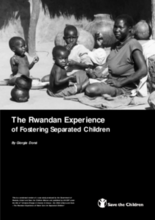This study was commissioned by UNICEF, the International Save the Children Alliance and the Government of Rwanda. Following the genocide and civil war in 1994, fostering has been promoted by the Government and by agencies as the preferred option for younger separated children unable to return to the care of their own families. Although responsibility for the care of children is traditionally shared within the extended family and with close friends, care by strangers has not been common. Approximately 1 200 children have been fostered by agencies (referred to as “formal” or “agency” fostering), but in addition there is believed to be a much larger number of children who have been spontaneously taken in by unrelated families (referred to as “spontaneous” or “informal” fostering). However, little has been done to inquire into the circumstances of either group and little is known about how they are faring.
The study involved an examination of formal fostering policy and practice from the point of view of the Government and fostering agencies, and an exploration of the perceptions of fostering of children, foster parents, local authorities and other members of local communities. The community-based research encompassed both formal and spontaneous fostering, and was conducted in 8 Communes in 5 different Prefectures, and methods included semi-structured interviews, focus group discussions, and group sessions with children using various activities.
©Save the Children

